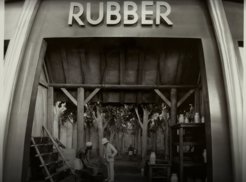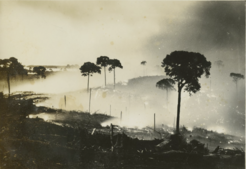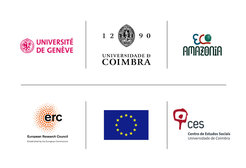RESILIENT Forest Cities: Utopia and Development in the Modern Amazon
RESILIENT: Forest Cities - Utopia and Development in the Modern Amazon is a 3 year funded project as part of the Gerda Henkel Foundation special Programme: Lost Cities: Perception of and living with abandoned cities in the cultures of the world. The project aims to foster critical debate on land use and urbanization in tropical forests and its global impacts by combining multidisciplinary approaches to study 'abandoned cities' in the Amazon, which were created in association with various extractivist projects throughout the 20th century.
RESILIENT will use multiple historical documents, photographs, maps and testimonials to explore the resilience of industrial cities in tropical forests from both a human and non-human perspective. Amazonian abandoned cities are privileged spots for investigating the pitfalls of discourses on modernization and progress so prevalent on large-scale development projects, which continue to shape the imaginings, expectations, and lives of people in the Amazon to this day.
The project is hosted at the Max Planck Institute of Geoanthropology (Department of Coevolution, Land Use, and Urbanization) and has been conceived of, and developed, in collaboration with the University of Geneva (Eccellenza-funded research group ANTROPOSOUTH) and the University of Coimbra (ERC-funded research group ECO: Amazônia). Collaborations with Brazilian universities and institutions, including Federal University of Pará, Museu Goeldi and Federal University of Amapá, are also a key part of the project’s work. Expected outputs of the project include a photobook, a film, and an exhibition in addition to papers, book chapters publication and, a Special Issue
Research

Ford Exhibition Building, Century of Progress International Exposition, Chicago, Illinois, 1934
In 1972, Brazil inaugurated one of the world's largest highways. This road did not follow the Brazilian coastline to connect the country's major capitals. Instead, it cut through the heart of the Amazon rainforest, justifying the road’s name, Transamazonica. Its official establishment triggered a massive influx of landless peasants, investments from international private companies, and the establishing of numerous company-towns in the region, often encroaching on Indigenous communities and settlements.
Public officials captured the zeitgeist of an urban-industrial imaginary future to the forest that proliferated at this time. The prevailing developmental mindset was translated into plans for hydroelectric power dams, mining fields and oil and rubber exploitation, with new extractivist forms of land use tied up with urban projects that seemed emblematic of the emergence of the Anthropocene. These aspirations came with a cost of agrarian conflicts, deforestation, and human rights violations brought about by the new territorial model, with long-held Indigenous forms of land use and cosmologies marginalized.

Nevertheless, by the mid-1980s, many newspapers labeled many of these company-towns as underdeveloped and abandoned. While various factors contributed to this, development agencies frequently attributed this failure to the untamed ‘wilderness’ of the forest. This argument can be historically linked to other Western, industrial assumptions that equated abandoned cities with the idea of an unconquerable and pristine nature in the Amazon and tropical forests worldwide.
Through an investigation rooted in an interdisciplinary approach, the project delves into the resilience of Amazonian industrial cities within tropical forests. The goals of the project are structured around three main axes, focusing on:
- Building a comprehensive picture of the impact of so-called extractive urbanism in the Amazon;
- Interpreting the entanglements of abandoned cities with developmentalist ideals, capitalist frontier expansion, and circulation of technocratic utopias;
- Tracking land use modifications as a result of urban networks created in the rainforest during the 20th century;
- Comparing different concepts of city, urban and non-urban, as well as the disputed meanings of abandonment among actors involved;
- Unveiling the socio-environmental resilience of the former company-towns studied;
- Assessing the centrality of non-human relations and the environment in the success or failure of urban spaces.
Activities and plans in 2025
January and February: archival research, fieldwork and photobook production (in collaboration with Christian Braga) in Brazil (Danielle Viegas. Julia de Medeiros and Henrique Gasperin). Locations visited: Monte Dourado and Laranjal do Jari, Marituba, Serra do Navio, Santana, Belterra, Nova Olinda do Norte.
March: Guest conferences / seminars on Amazon developmentalism and climate denial with Klaus Ramalho von Behr (Brasilia/Potsdam) and Antoine Acker, University of Geneva
April: Talk by Julia de Medeiros. Department of Coevolution of Land Use and Urbanisation - MPI Geoanthropology. Jena, Germany.
May: LASA. São Francisco, US. Panel: The Amazon River Basin: Extractivism, Indigenous Perspectives and an Aesthetics of Resistance (Patrícia Vieira and Danielle Viegas). Presentation by Julia de Medeiros.
Bethlehem and Delaware, US. Archival research at the Hagley Museum and National Museum of Industrial History. (Julia de Medeiros)
July: SOLCHA, Rio de Janeiro, Brazil. Panel: Extrativismos, infra-estruturas e desenvolvimento na Amazônia Moderna. (Danielle Viegas and Antoine Acker). Presentations by Danielle Viegas, Julia de Medeiros and Henrique Gasperin.
Film shooting by the means of the Gerda Henkel Foundation.
Results and Publications
Podcast
Networking with plants in the Anthropocene (Podcast). Interview with Prof. Patrícia Vieira. https://soundcloud.com/networking-with-plants/episode-19-kate-brelje-interviews-patricia-vieira
Exhibition
Forest Cities: The Amazon Between Ruins and Resilience (Campus Anthropocene, 2024)
Workshop
“Cartas Visuais para Futuros no Antropoceno” (Visual Letters for a Future in the Anthropocene). Rio de Janeiro, Brazil (Julia de Medeiros and Henrique Gasperin) In collaboration with Freg Stokes (Invited researcher) and Danielle Viegas (org.)
Special Issue on Amazonian Global History (2025). Organized by Danielle Viegas, Antoine Acker, Patrick Roberts and Patrícia Vieira.
Monde(s): Histoire, Espaces, Relations
Gerda Henkel Film - PORTAL L.I.S.A. (2025)
RESILIENT: forest cities, development, and utopia in Modern Amazon.
Papers
Book Chapters
Viegas, Danielle H.; Bailão, André C.; da Silva, André Felipe C.; Gasperin, Henrique B.; Roberts, Patrick. The Amazon as a Global Arena: Climate Change, Politics, and Knowledge in the Great Acceleration. IN: Rohland, Eleonora; García Acosta, Virginia; Goebel McDermott, Anthony; Taks, Javier. The Anthropocene as Multiple Crisis: Latin American Perspectives. CALAS Handbook Series III. Bielefeld: Bielefeld University Press, 2025.
Vieira, Patrícia. “Las Vidas de los Ríos Amazónicos.” Parana Twana / Alma del río: La vida en las comunidades ribereñas del Marañon, p. 31-33. In: Juanjo Fernández. Parana Twana / Alma del río: La vida en las comunidades ribereñas del Marañon. Lima: Pakarina Ediciones. 2024.
Edited Books
Olaf Kaltmeier / Antoine Acker / León Enrique Ávila Romero / Regina Horta Duarte (Eds.) Biodiversity – Handbook of the Anthropocene in Latin America II. The Anthropocene as Multiple Crisis: Latin American Perspectives. CALAS Handbook Series II. Bielefeld: Bielefeld University Press, 2025.
Viera, Patrícia. The Amazon River Basin: Extractivism, Indigenous Perspectives and a Political Aesthetics of Resistance (editing).
Partners















